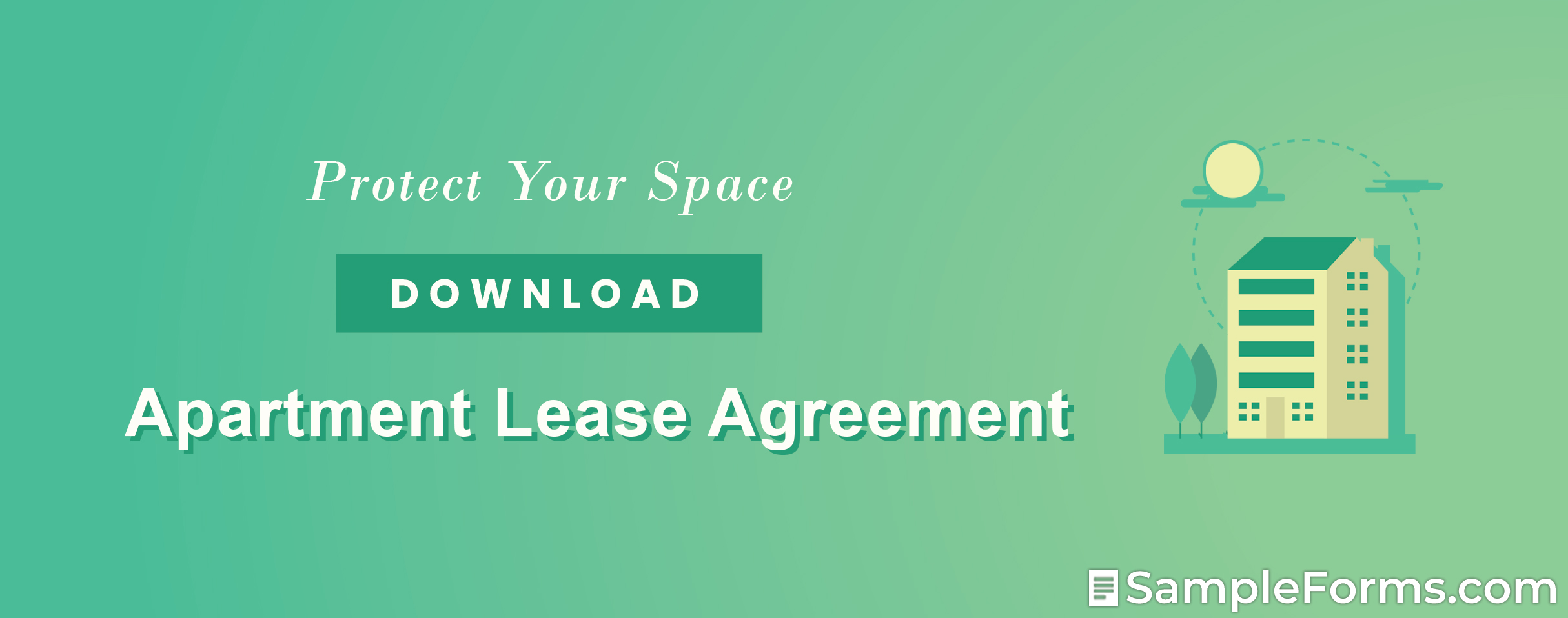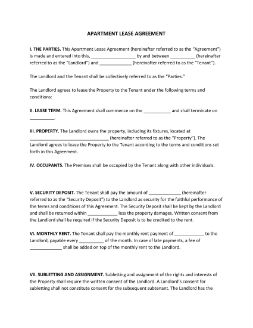- Eviction Notice Forms
- Power of Attorney Forms Forms
- Bill of Sale (Purchase Agreement) Forms
- Lease Agreement Forms
- Rental Application Forms
- Living Will Forms Forms
- Recommendation Letters Forms
- Resignation Letters Forms
- Release of Liability Agreement Forms
- Promissory Note Forms
- LLC Operating Agreement Forms
- Deed of Sale Forms
- Consent Form Forms
- Support Affidavit Forms
- Paternity Affidavit Forms
- Marital Affidavit Forms
- Financial Affidavit Forms
- Residential Affidavit Forms
- Affidavit of Identity Forms
- Affidavit of Title Forms
- Employment Affidavit Forms
- Affidavit of Loss Forms
- Gift Affidavit Forms
- Small Estate Affidavit Forms
- Service Affidavit Forms
- Heirship Affidavit Forms
- Survivorship Affidavit Forms
- Desistance Affidavit Forms
- Discrepancy Affidavit Forms
- Guardianship Affidavit Forms
- Undertaking Affidavit Forms
- General Affidavit Forms
- Affidavit of Death Forms
Apartment Lease Agreement
Like a typical company, the landlord shall set ground rules to ensure peace and order within the community, and to foster a positive landlord-tenant relationship. Such is found in an apartment rental agreement that the tenant has to sign before the official move-in. This article discusses the importance of an apartment lease agreement. Read More
Apartment Lease Agreement
What Is an Apartment Lease Agreement?
An apartment rental or lease agreement is a contract between the landlord and the tenant containing the dos, don’ts, and responsibilities of each party. For the agreement to be enforceable, it has to be legally binding, and for it to be legally binding, it should have mutual approval, legal basis, reciprocal agreement, capable parties, and offer and acceptance. According to Trend Statistics, about 25-34 years old of single individuals comprise 30% of the rental market. 60% of the residents of the District of Columbia consider their rented apartment home, New York at 47%, and Hawaii and California with 43% each.
How to Create an Apartment Rental Agreement?
You can have your agreement made by a lawyer, or you can make it from scratch. If you prefer the latter, here’s how:
1. Collect the Other Party’s Personal Information
Include the tenant’s name, mailing address, phone number, and any other relevant information. This personal information will be applicable when you need to send a notice to the tenant. If you should, ask for a government-issued document to ensure its accuracy.
2. Specify Lease Type
Lease types are either in fixed or month-to-month terms. Fixed-term commonly refers to the occupancy that lasts up to one year—unless a period has been agreed upon by both parties. Whereas, a month-to-month term is an on-going basis occupancy type and can be canceled by either party. The term is either stated in the standard lease agreement or following the State’s minimum requirement with 30-60 days written notice.
3. Include the Apartment’s Specifics
Provide a description or information about the premises you want to lease. Include the property’s address, furniture and fixtures, appliances, utilities, and services. You can also stipulate the number of bedrooms and bathrooms that the property has. Don’t forget to include who is responsible for providing and paying such and include defects on the real estate property.
4. Include Agreement Stipulations
The month to month lease agreement’s stipulations consist of the ground rules that the tenant must observe while they are bound to the agreement. This includes the security deposit, monthly rent, general maintenance and repair, indemnification, termination clause, and many more. You may charge the tenant for a specific breach of a stipulation in the agreement, such as Pet Fees, Smoking Fees, Guest/s Overstay Fee/s, etc. The agreement must be by the laws of the State in which the property is located.
5. Sign the Agreement
You cannot complete any deal without the signatures of both parties. Sign the agreement at the bottom of the document with your name and your witnesses’ name and signature.
Now, for the agreement to be legally binding and enforceable, the law requires the other party to be at least 18 years of age, to be of sound mind and in no way coerced into signing. This is where the importance of a witness comes in—proving all three and ensuring that the signatures weren’t forged and are accurate. If any of these three are violated, then consider your agreement null and void.
6. Review the Rental Agreement
The rental form agreement may come in handy in case of future disputes—so ensure its validity and accuracy the first time. Take time to review the rental agreement if you have failed to include something of importance. Give yourself two to three days to review the said document to prevent potential financial losses in the future.
FAQs
Are lease and rent identical?
The difference between the two is their duration. A lease lasts according to the date set in the agreement. A rent, on the other hand, refers to a short-term period that is not in agreement.
Do I need a lawyer to make my rental agreement?
No. You do not need a lawyer to write your rental agreement. You can write yours as long as it has the necessary information needed to enforce the terms and conditions. It should also be compliant with the State laws where the property belongs to.
Is it okay to move out before the lease ends?
According to Stack Exchange, unless otherwise stated in your state laws, you are obligated to pay the monthly rent continuously until the lease ends. The landlord, however, is legally obligated to rent the property out as soon as possible. Just make sure to ask for a rent receipt always.
Can I sue my landlord for lying?
Yes, according to Realtor, if you think your landlord is trying to evict you illegally, you may remain on the property and sue them. If you are already evicted from the property, the court may ask your landlord to reimburse you the costs incurred stemming from the illegal eviction.
What are the legal reasons to break a lease?
According to Choice, these three reasons are breach (whether repeated or not) of an agreement by the landlord, undue hardship, and inhabitable premises.
Our home is the once place that we seek solace from after a tiring day at work. It is also the place where we can let our guards down and drown our sorrows away without being judged by the onlookers. Therefore, we must ensure that it is an excellent place to live in the first place by securing ourselves with an effective apartment rental agreement. The agreement serves as a tool that we are getting what we bargained for. It encourages the responsible tenant in us. It fosters a harmonious relationship with the landlord and other tenants.

